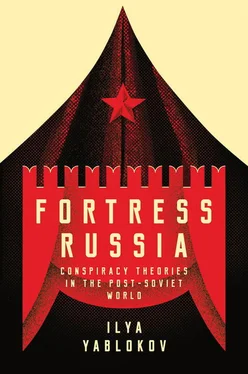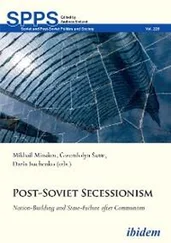The story of the ‘spy rock’, and the way it was interpreted in conspiratorial terms in the federal media and among leading politicians, is the first example of state-aligned Russian television taking on the role of pacesetter in the Russian political agenda. The structure of the film’s narrative and the fact that no representatives of the accused organizations were invited to appear on the programme provided space for the articulation of all possible conspiratorial allegations aimed at the delegitimization of NGOs by claiming a connection between them and foreign intelligence services. Despite the demands of civic activists that journalists withdraw their accusations, and a lawsuit against Mamontov himself initiated by the leader of the Moscow Helsinki Group, Liudmila Alekseeva, the conspiratorial narrative about NGOs continued to play a major role in political discourse from 2006 onwards. Given that funding from foreign bodies was seriously restricted since the mid 2000s and left the state in the position of the major sponsor of NGOs, the conspiratorial narrative about NGOs in the media had a negative effect on the development of civil society and democracy in Russia which became evident over the course of the next few years (Crotty et al., 2014). When the regime faced the new and unexpected threat from the grassroots movement, the conspiratorial narrative was developed further to curtail the work of NGOs and justify the new wave of repressions.
The unprecedented wave of civic activism in the post-election period in 2011–12 made NGOs a primary object of governmental surveillance and repression. As Daniel Treisman noted (2013, p. 254), the Kremlin’s strategy for dealing with the opposition in the aftermath of the rallies was to co-opt, intimidate and disable. The NGOs were at the top of Kremlin’s agenda to receive this treatment.
The initial pretext for the new campaign against them was somewhat accidental. In January 2012, during the peak of the protests, BBC 2 broadcast a documentary entitled Putin, Russia and the West . In the second episode, Tony Blair’s Chief of Staff, Jonathan Powell, admitted, as we noted earlier, that the ‘spy rock’ which triggered the campaign against NGOs in 2006 had been real ( Putin, Russia and the West. Episode 2: Democracy Threatens , 2012). This revelation was truly shocking to members of the opposition, who had believed the ‘spy rock’ story to have been invented by the FSB. Powell’s admission was the headline of the day and was immediately used by pro-Kremlin journalists and public intellectuals in their attack on the opposition and their rallies (Channel One, 2012a; Vesti.ru, 2012). Mamontov gave several interviews to pro-Kremlin journalists in which he criticized leaders of the opposition for being hypocritical and for lacking loyalty towards their country (Cherkudinova, 2012). The conspiratorial ideas which had been elaborated in the mid 2000s by Putin and his supporters were revived and used once again against political opponents.
This unexpected development provided Mamontov with an opportunity to make another documentary on the topic, entitled Shpionskii kamen’ ( The Spy Rock ) which was broadcast on 22 January 2012 (Spetsial’nyi korrespondent: Shpionskii kamen’, 2012). Based on Powell’s interview, Mamontov accused several leaders of Russian NGOs of having dual citizenship and thus linked them with the USA, Russia’s political Other. The primary object of his attack was Liudmila Alekseeva, who received a US passport in 1982 after being expelled from the Soviet Union for human rights activities (Rights in Russia, 2012). Although having dual citizenship is not uncommon, the Russian authorities and pro-Kremlin intellectuals see it as a sign of potential disloyalty. It is no surprise, then, that after the annexation of Crimea and the increase in authoritarian tendencies, this conspiratorial metaphor was used by various statesmen to justify their adoption of the new law on dual citizenship (Masis, 2016).
Mamontov, following the same line of reasoning, discursively separated NGO leaders from the rest of the nation in accordance with their alleged disloyalty to Russian citizens. Pointing out that every new US citizen must swear an oath of loyalty to the country, Mamontov claimed having dual citizenship inevitably created a conflict of loyalties. The reference to foreign citizenship alongside the presentation of evidence about British espionage served to further enhance the conspiratorial image of civic organizations. Mamontov’s programme became the starting point for another round of conspiracy mythmaking against NGOs. To link Alekseeva’s dual citizenship to her activity within Russia, Mamontov introduced the term ‘foreign agents’ ( inostrannye agenty ) to describe organizations which engaged in political activism and were funded from abroad.
To support this, Mamontov suggested that the Foreign Agents Registration Act (FARA) in the USA could be used as a template for Russian policy concerning NGOs (Spetsial’nyi korrespondent: Shpionskii kamen’, 2012). This law, which was introduced in the USA in 1938, required organizations which were in any way affiliated with foreign powers to register as foreign agents with the Ministry of Justice (Kara-Murza, 2013). Intended primarily for use against any possible Nazi infiltration, the law was amended in the 1960s so that the term ‘foreign agent’ was applied to any organization which sought to derive income or gain political advantage by influencing American governmental policies. For the Russians, the main point about this law was that American counter-intelligence was officially responsible for monitoring such organizations.
This highly selective use of foreign legislation is characteristic of Kremlin policies to implement controversial laws. By referring to so-called ‘Western practices’, pro-Kremlin politicians and loyal intellectuals could justify their actions as ‘conventional’ (see Schimpfossl and Yablokov, 2014, p. 305). The US law to monitor foreign lobbying groups and organizations operating within their country served to legitimize the introduction of further amendments into the Russian legislation on NGOs. Reference to the US law could also be used to reinforce the notion of an internal enemy and to claim the existence of subversive groups within Russia. In the USA, however, the law is applied to representatives of foreign governments and political parties who are affiliated with that state and represent its interests in the USA. Moreover, for them to fall foul of the law, it must be proven in court that the aim of the ‘foreign agents’ is to promote the interests of their own countries to the detriment of the USA (Koalitsiia pravozashchitnikov, 2016).
A group of pro-Kremlin public intellectuals and Duma deputies, with the support of the state-aligned media, now carried out a new campaign promoting anti-Western conspiratorial notions. This alliance had proved in the past to be efficient at disseminating far-reaching conspiratorial notions among the public and using them to justify the adoption of more restrictive laws. Veronika Krasheninnikova, former head of the Council for Trade and Economic Cooperation USA-CIS, justified the amendments by reference to her personal experience. In 2006–10 she was a representative of the city of St Petersburg in the USA and was registered as a foreign agent. This, she explained, was ‘common practice’ in a democratic country (Azar and Krasheninnikova, 2013).
Despite references to the US legislation, in the Russian context the term ‘foreign agent’ had a different connotation; it recalled the accusations levelled against numerous Soviet citizens during the Great Purges in the 1930s. The reintroduction of the term and its use against NGOs aimed at ‘othering’ them and demonstrated the Kremlin’s engagement with the politics of historical memory (see Miller, 2012a). However, the official initiators of the new law tried to separate the term from the memory of Stalinist repression and link it instead to so-called ‘international standards of work with NGOs’ (Kostin, 2013) .Yet the introduction of terms which are closely related to the memory of the Great Purge demonstrates the dependence of the official political discourse on the vocabulary of the Soviet era. At the same time, as Oushakine has argued (2000, pp. 998–9), using this language of the past demonstrates the remoteness of the context in which it was initially utilized. At the time of Stalin’s repressions, being accused of being a ‘foreign agent’ would result in immediate arrest. However, during the campaign in 2012 it was emphasized that applying the term to an NGO would not necessarily lead to its repression, and that the law simply required an indication in the title of an organization that it was affiliated with a foreign sponsor (Smirnov, 2012).
Читать дальше
Конец ознакомительного отрывка
Купить книгу












